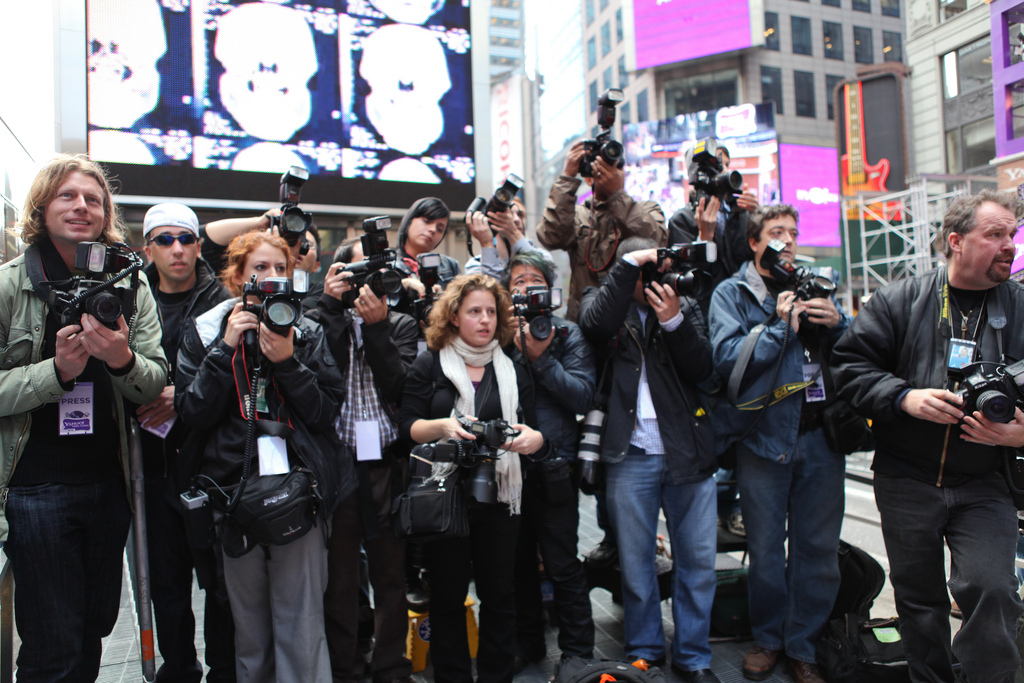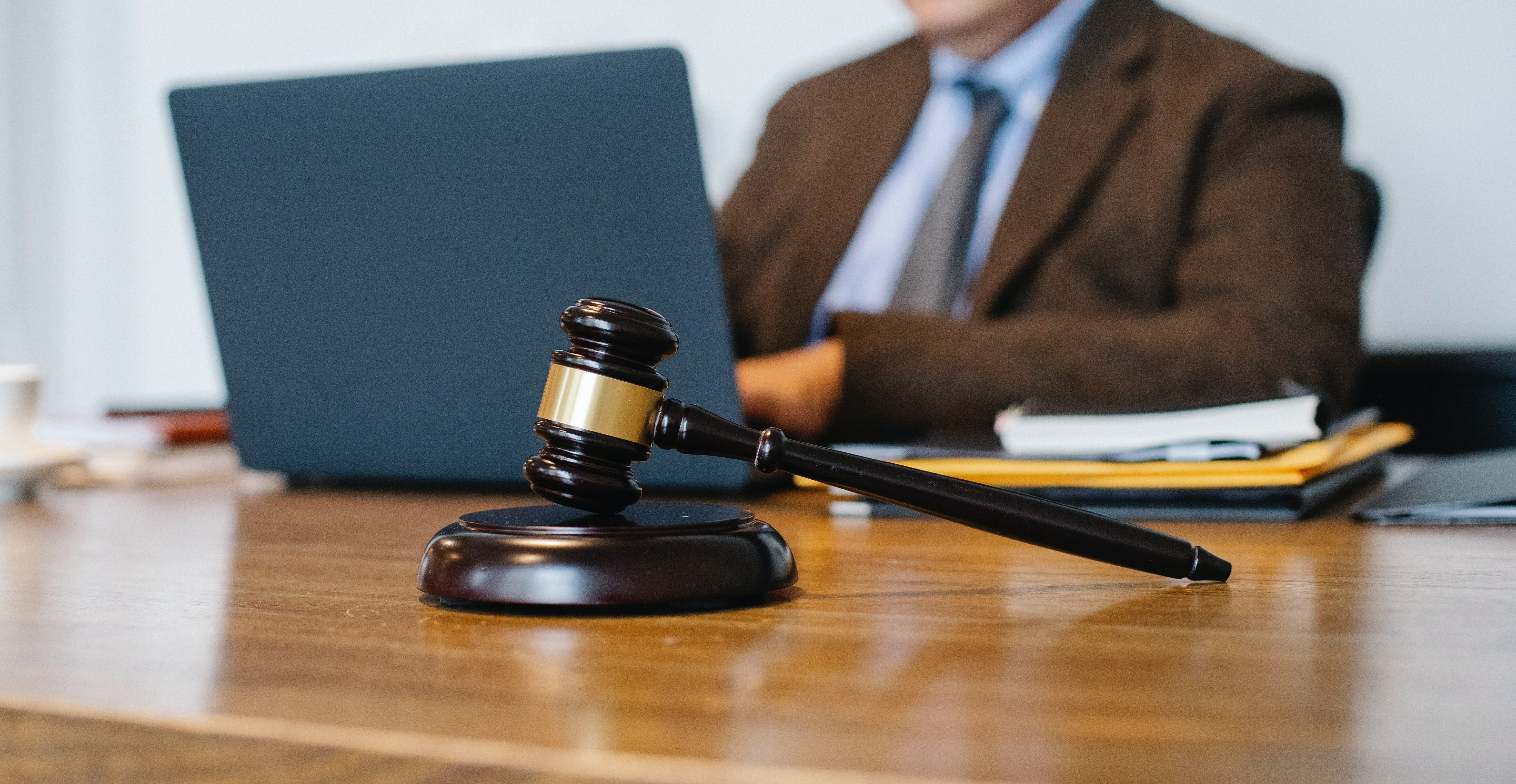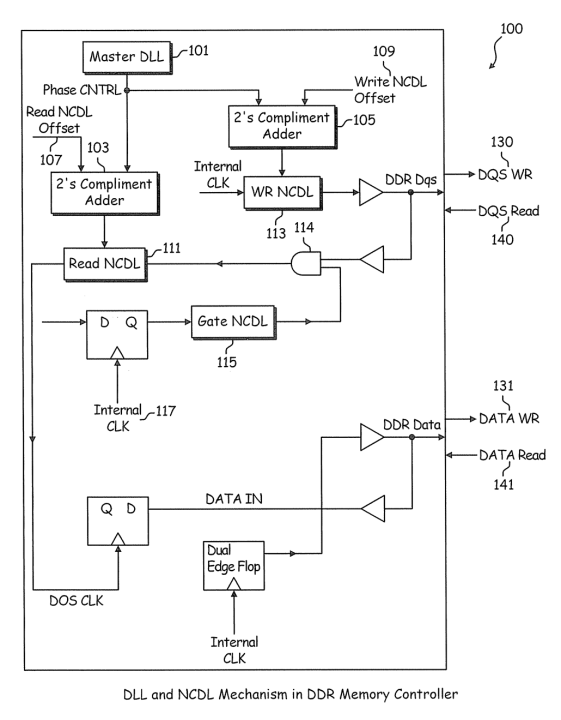For most of the working-class, value comes from the ability to perform in a professional setting. However, for celebrities, it’s a different story — their value lies in an indicia of their identity. As public figures, they have the power to influence large portions of the population. Recognizing a celebrity in an advertisement helps consumers to remember the product, and when we like the celebrity, it prompts a positive view of the product. This is why a celebrity can make a fortune by simply taking a picture next to a product.
The real question is, what stops a company from imitating famous personas commercially? And what steps can celebrities take to prevent this from happening? There are a few ways to mitigate this issue, but the two that encompass the most protection are trademarks and the right of publicity.
Own Your Identity
The right of publicity is a relatively new form of intellectual property granted only to individuals to ensure commercial control of one’s name, likeness (i.e. your defining attributes) and other traits which make up one’s personal identity. Since the right of publicity has yet to be recognized federally, the protectable personal attributes vary from state to state and can range from personal traits, such as your typical physical appearance, to your signature, and even something as small as your mannerisms.
Trademarks, which are known for protecting symbols and images, also come into play with names and likeness. The range of traits which are protected by trademarks are limited only to those that fulfill the following features:
- The name or likeness must have (or prove intent to make) a connection with a good or service, in addition to the person themself.
- The name or likeness must be unique enough for differentiation from those with similar good and services. This is why celebrities often come up with pseudonyms, or stage names, an example being Stefani Joanne Angelina Germanotta’s stage name, Lady Gaga.
- The name or likeness must be in continuous use and enforcement by a single source.
On the other hand, the right of publicity has no official requirements because it’s a right possessed by everyone, like the right to privacy. Though you don’t have to be famous to attain protection of your name and likeness, however, it’s more often utilized by celebrities due to the value behind their name. This universality of the right of publicity also depends on the state; in some, it is restricted only to those who have financial value in their identity. One difference between the two lies in the process of attainment.
That’s My Name, Don’t Wear it Out!
Trademarks and right of publicity also differ in how much of your likeness they protect. Trademarks focus more on protecting the aspects of one’s identity that can be used to represent a good or service. The right of publicity, contrarily, is more holistic in allowing you to control how others use or don’t use a part of your likeness that can be an identifier of oneself.
One area celebrities most commonly trademark are names, all of which can be found and analyzed within the ktMINE database. For example, actor Robert Downey Jr. filed to trademark his name a year after starring in the famous thriller, Iron Man. Downey’s trademark, to no surprise, is connected to his entertainment services, motion pictures, and service of promotion.
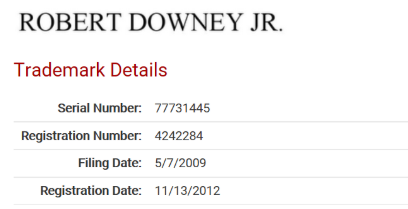
Source: ktMINE Trademark Database
The well-known reality star, Kylie Jenner, also has ownership of her name when back in 2014 she filed to trademark “Kylie” in relation to her multimillion-dollar cosmetic product line and entertainment services. Jenner also recently won a battle against Kylie Minogue, an Australian-British singer, and actress, to own “Kylie” for the purpose of advertising and promoting other brands, goods, and services. Below, the ktMINE database shows the filing of Minogue’s opposition in 2016 and its termination in 2017. Further, inspection shows the case was dismissed due to Minogue withdrawing her opposition. Other celebrities with trademarked names include newlywed Hailey Bieber (clothing), Jennifer Aniston (body spray and wash products), Morgan Freeman (entertainment) and the list goes on.

Source: ktMINE IP Platform
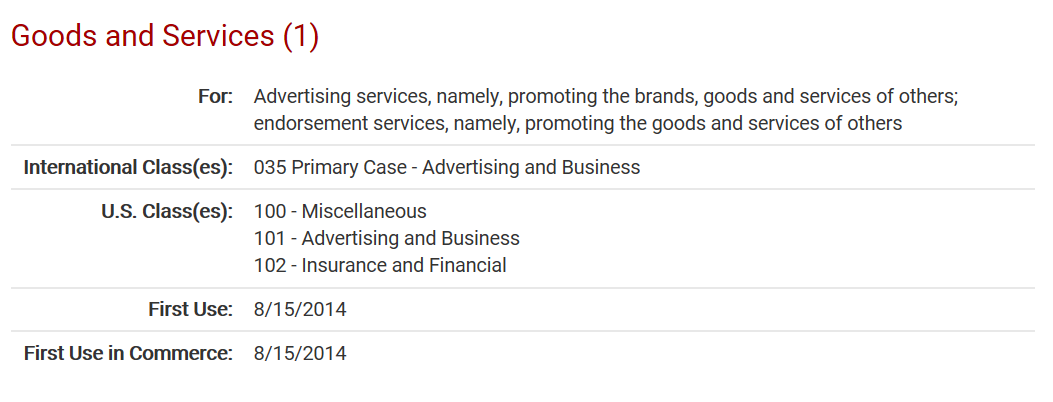
Source: ktMINE IP Platform
Trademarking baby names is another rising trend among the rich and famous. Singer Beyoncé registered the names of her kids and multiple names associated with her family. However, Jay-Z has been outspoken about trademarking to prevent others from using it, and while others capitalizing off of famous children’s names does not seem fair, without a continuous connection to a good or service, they can easily lose the trademarks they own.
“That’s Hot™”
Phrases often said by a celebrity that can be associated with them are also commonly trademarked. A famous example is “That’s hot,” owned by Paris Hilton for fashion goods and entertainment production. She owned the phrase in relation to other goods such as alcoholic beverages and electronic devices, but those have since been abandoned. Hilton put her ownership to use when she sued Hallmark for using her phrase and image in one of their greeting cards (the case was settled outside of court).

Source: The ktMINE Database shows Paris Hilton’s abandoned trademarks for electronic devices
Under TAS Right Management, LLC, Taylor Swift has also started a trend by registering lyric segments from songs off her 1989 album. The line “This sick beat” from her hit “Shake It Off” is registered for clothing tops, paper products, guitar picks, and drumstick; and “Party like it’s 1989” have been granted but not yet given a registration number for any of its applications. Both lyrics were also filed for multiple types of goods at the same time under Taylor Swift as an individual, but most of the lyrics filed under herself has been abandoned due to their being no statement of use or a lack of response. Other lyrics Swift has successfully registered under her LLC are shown below.

Source: The ktMINE database shows Swifts’ lyrics she filed for each good and/or service it is or will be connected to
As mentioned earlier, likeness can also be trademarked. This is not done often because the person would likely need to achieve a certain height of fame for their likeness to be distinctive. Colin Kaepernick is a recent example of someone who has filed for a trademark of their likeness. Kaepernick filed through his company Inked Flash, Inc. The image of his likeness is shown below with its intended associations.
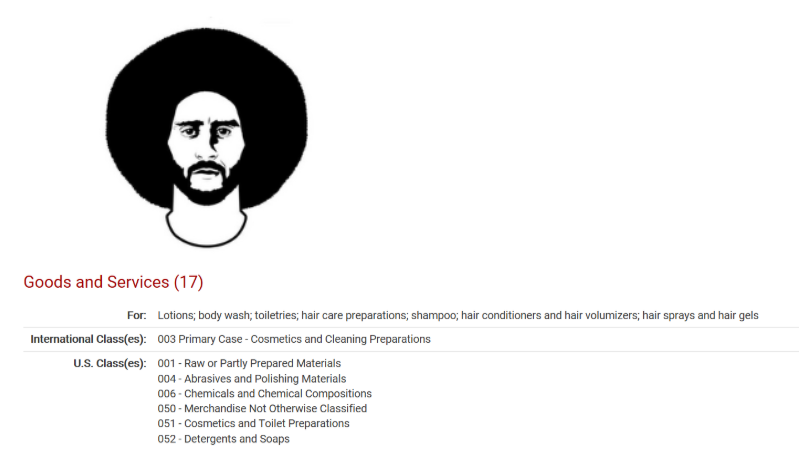
Source: ktMINE IP Platform
The Scope of Right of Publicity
The right of publicity covers more aspects of personal identity than trademarks do. This mainly includes aspects which are difficult to incorporate into an image or symbol such as personality, voice, and gestures. An example of an area not covered by trademarks is shown in a lawsuit involving a college football player, Ryan Hart, and game makers, Electronic Arts, over a character that not only physically resembled the player down to his exact height and weight, but also shared his biographical information such as his hometown and school year, and even had similar agility. In the appeal to the initial summary judgment, the ruling was reversed in Hart’s favor, stating that his right of publicity was violated and trumps the First Amendment protections.
Another aspect of your identity that the right of publicity protects, is your voice. This precedent was set when singer Bette Midler won a case against Ford Motor Company for using her own backup singer to imitate her in a commercial. The court ruled this a misappropriation of Midler’s singing favor, thus declaring her voice as a part of her identity. Yet, trademark law and rights of publicity overlap; if a celebrity is unable to trademark something, like Beyoncé regarding her daughters’ name, or Ryan Hart’s biographical information, the right of publicity is a “Plan B” that can be used as a defense in court.
Are There Exceptions to Using Others’ Protected Identity?
Anyone in a public place is subject to any photos/videos taken of them, but are aspects of our identity the same way? Yes. As long as it is not in commercial use (or being misappropriated), the public aspects of your identity can be copied, displayed and discussed. The common exempt uses of name and likeness regarding both trademarks and right of publicity are:
- Parodies, such as the skits on Saturday Night Live;
- Comparative advertisements;
- Creative works of non-fictional such as novels, documentaries, movies; and
- Informative and commentary work like a news report, article, or a YouTube video.
These exceptions were founded based on our freedom of expression under the First Amendment.
Additional limits can be drawn from examining the legal restrictions of using a celebrity’s name and likeness restrictions set by precedence. For non-famous trademarks, infringement has occurred only if you prove the commercial use of the celebrities name or likeness has caused confusion regarding the “[…] origin, sponsorship, or approval of his or her goods, services, or commercial activities by another person.” Thus, if the user does not confusingly associate a celebrity with a good/service that the celebrity also already has an association to, it is allowed. As for the right of publicity, one district court case has set the local standard that for a violation to occur, the use would have to be commercial, non-consensual and evoke an association. This ruling implies that the commercial use of the name and likeness is accepted if it is not extensive enough to enable the identification of a specific celebrity, so to induce an association. This was ruled to be the case when the promotional use of the phrase “Here’s Johnny Portable Toilet” violated Johnny Carson’s right of publicity due to the phrase being regularly said on his show.
Do We Need Right of Publicity?
Overall, it appears as though the right of publicity is easier to gain access to, has more coverage over what identifies us, and is easier to prove in court (confusion versus association). However, some question the necessity for the right of publicity. The right of publicity does not officially require a connection to a good or service like trademarks, but because it only protects our identity when in commercial use, it’s likely to be connected to the goods or services companies sell anyway. The dilution theory further equalizes what is protected of the identity when comparing the right of publicity to famous trademarks. Under the dilution theory, famous marks extend beyond the specific product to all products. This, in addition to the fact that copyright, the right of privacy, and unfair competition cover the areas of likeness that trademarks do not, makes the right of publicity seem redundant. The most significant protection brought by having the right of publicity which is not granted elsewhere is the unique cases where specific details of a celebrity are being infringed.
